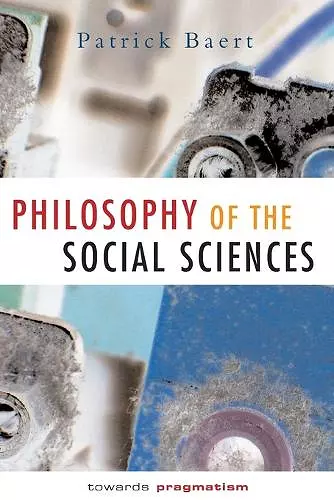Philosophy of the Social Sciences
Towards Pragmatism
Format:Paperback
Publisher:John Wiley and Sons Ltd
Published:1st Nov '05
Should be back in stock very soon

In this ground-breaking new text, Patrick Baert analyses the central perspectives in the philosophy of social science, critically investigating the work of Durkheim, Weber, Popper, critical realism, critical theory, and Rorty's neo pragmatism.
- Places key writers in their social and political contexts, helping to make their ideas meaningful to students.
- Shows how these authors’ views have practical uses in empirical research.
- Lively approach that makes complex ideas understandable to upper-level students, as well as having scholarly appeal.
“Baert’s summary of influential perspectives in the history of social-scientific concept formation is very useful and can be recommended as a current brand-leader amongst textbooks in this field ... This book extends its scope beyond the provision of reliable summary and it leads theory forward in an engaged and productive direction.”
British Journal of Socioliogy
“Patrick Baert has written another well argued and lucid introduction to methodological and theoretical problems in social research.”
Sociological Review
“Patrick Baert elegantly and skilfully demonstrates the continuities between philosophical and social scientific concerns in this field. This book contains both an outstanding critical discussion and a powerful argument for a pragmatist position.”
William Outhwaite, University of Sussex
“Baert’s thorough-going pragmatism is an enormously promising redirection of philosophical debate in and about the social sciences. This is an ambitious treatment of canonical figures whose philosophical reflection has been influential in the social science – Durkheim, Weber, Popper, the critical realists, Habermas, and several latter day pragmatists. Crucially, it is a treatment that exemplifies what Baert advocates: he contextualizes these theorists and their arguments, puts them in dialog with one another, and extracts philosophical lessons that not only bear on
philosophical traditions of debate but that are consequential for social scientists as well. I recommend it to anyone, philosopher or social scientist, student or established professional, who thinks critically about the goals and assumptions of the social sciences.”
Alison Wylie,University of Washington
ISBN: 9780745622477
Dimensions: 231mm x 152mm x 18mm
Weight: 340g
264 pages